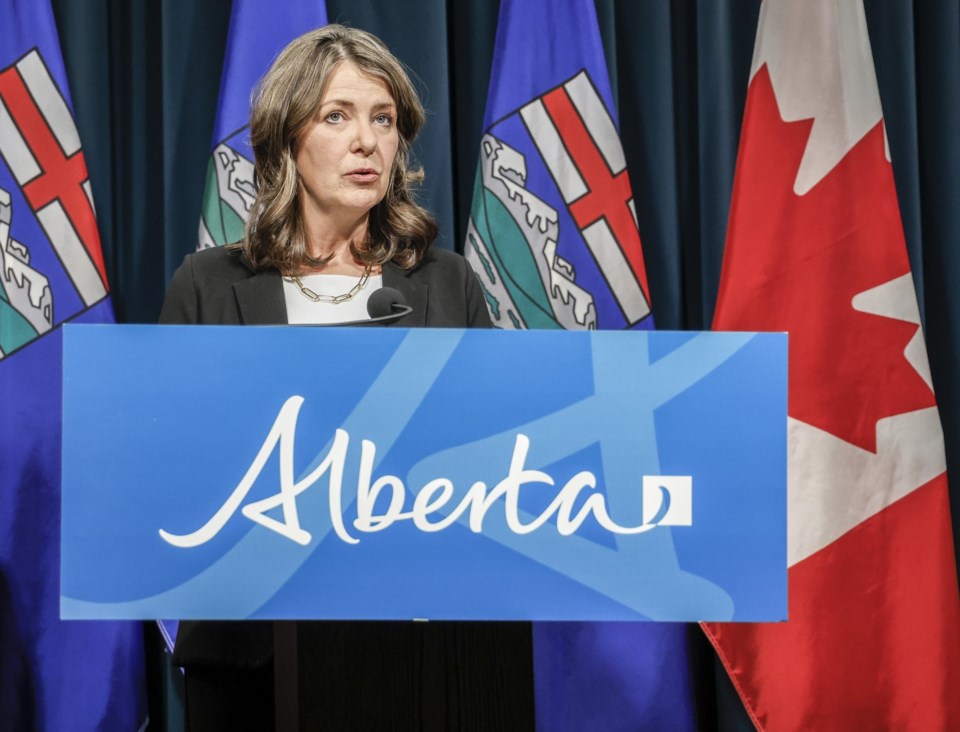EDMONTON — An Alberta judge has put on hold a provincial law that bans doctors from providing gender-affirming care to youth.
Justice Allison Kuntz, in a written judgment Friday, said the law raises serious Charter issues that need to be hashed out in court, and issued a temporary injunction against it before it fully came into effect.
Kuntz wrote that a temporary stop is needed while the issue is debated.
"The evidence shows that singling out health care for gender diverse youth and making it subject to government control will cause irreparable harm to gender diverse youth by reinforcing the discrimination and prejudice that they are already subjected to," Kuntz wrote in the judgment.
"Intentionally or not, the ban will signal that there is something wrong with or suspect about having a gender identity that is different than the sex you were assigned at birth."
The law, passed late last year but not fully in effect, bans doctors from providing treatment such as puberty blockers and hormone therapy to those under 16.
LGBTQ+ advocacy groups Egale Canada and the Skipping Stone Foundation — as well as five transgender youth who would be affected by the law — took the province to court the same month it passed.
In the Friday decision, Kuntz wrote that denying treatment risks causing youth emotional harm and exposing them to permanent physical changes that don't match their gender identity.
The government, according to the decision, argued that claims of harm were speculative considering the law wasn't fully in effect, and that the treatments the law seeks to ban aren't scientifically supported.
Kuntz wrote that the advocacy groups also submitted scientific evidence on the treatments that support their perspectives, but the injunction hearings weren't the appropriate stage to determine which side's evidence stood taller.
Kuntz, however, largely sided with the advocacy group's evidence in her decision.
She wrote that the government's scientific evidence wasn't "so overwhelming" as to prevent a finding that the youth's human rights are being infringed upon.
The province also argued that the law didn't cause the psychological harm facing the youth involved in the case, but it was a result of going through puberty.
"The starting point for an alleged harm might not be caused by government action, but government action may impact an individual’s ability to address the harm in a way that infringes their Charter rights and causes further harm," Kuntz wrote in response to that argument.
Egale's legal director Bennett Jensen said Friday that the decision was a "huge relief."
"(The legislation) does not solve any real issues in the medical system," Jensen said in an interview.
"It simply creates them and targets an already very vulnerable, small group of young people with further discrimination, and that's what the judge found."
Premier Danielle Smith has said she believes the legislation is needed to protect young people from making permanent, life-altering decisions.
Smith has said it's about preserving that adult choice, and that making "permanent and irreversible decisions" about one's biological sex while still a child can limit that.
Kuntz, in her decision, disagreed and said Alberta's law was not necessary to preserve choice.
"That choice is available without government intervention," Kuntz wrote.
"The ban takes away choice in favour of preserving a very specific choice that some youth may not want to preserve, or that some youth may want to approach differently than the ban assumes."
Alberta Justice Minister Mickey Amery's press secretary, Heather Jenkins, reiterated in an email that the legislation protects youth from making irreversible decisions.
"Alberta’s government will continue to vigorously defend our position in court and is considering all options with respect to the court’s decision," Jenkins said.
Opposition NDP Leader Naheed Nenshi said in a statement that his party was pleased with the decision, calling it a "great day for young Albertans who simply want to live authentically and safely."
“This was never about doing the right thing: it was always about demonizing vulnerable kids to boost Danielle Smith’s political fortunes," Nenshi said.
Also lauding the decision Friday was Senator Kris Wells, the former Canada Research Chair for the Public Understanding of Sexual and Gender Minority Youth.
"This isn’t just a win for trans youth, it is a win for Canada’s health-care system," Wells wrote on social media.
"No politician should be dictating or restricting your access to evidence-based medical care."
Egale and the Skipping Stone Foundation aren't the only groups challenging the bill.
Last month, the Canadian Medical Association and three Alberta-based doctors launched a legal case challenging the legislation's constitutionality, arguing it violates their Charter right to freedom of conscience.
Alberta's other two pieces of transgender legislation — banning transgender women from competing in women's sports and requiring children under 16 to have parental consent to change their names or pronouns at school — have yet to be challenged in court.
The education bill also requires parents to opt in for their children to receive lessons in school on sexuality, sexual orientation and gender identity.
The next step after Friday's decision is for both sides to make substantive arguments before the court on whether the law violates Charter rights, but Jensen said dates for arguments have yet to be set.
— with files from Aaron Sousa
This report by The Canadian Press was first published June 27, 2025.
Lisa Johnson and Jack Farrell, The Canadian Press



